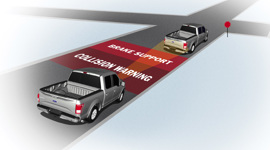Forty countries have signed on to a United Nations draft regulation requiring that automatic braking be made standard in new cars. Those initial signatories include Japan and numerous European Union nations – who created the regulation – but not Canada or the US.
That group of nations created the regulation under the auspices of the UN Economic Commission for Europe (UNECE) and the World Forum for Harmonization of Vehicle Regulations. The draft will be presented to the UN forum for a vote in June, and if it is adopted, it would come into force early 2020.
The new rule would require all new cars to brake automatically if a collision seems imminent. The mandatory system would work at speeds less than 60 km/h, leaving automakers to decide whether to add highway speed functionality as standard or as an option.
The United States is a member of the World Forum for Harmonization of Vehicle Regulations. However, an Associated Press report said the US opted out of the UN rule in order to maintain control over its auto industry regulations.
In 2016, 20 automakers made a voluntary deal with the US government to make automatic emergency braking standard starting in September 2022. A year later, the US National Highway Traffic Safety Administration (NHTSA) reported that a fifth of those companies had made the safety feature standard in more than half their respective lineups.
The close ties between the US and Canadian auto industries mean Canada's vehicle safety regulations are often harmonized with America's. But the Comprehensive Economic and Trade Agreement (CETA) between Canada and the EU could open the door to Canada adopting the new regulations even if the US doesn't.
Canada is also a signatory to the UN's 1998 Agreement on UN Global Technical Regulations, which promotes worldwide harmonization of "regulations regarding the safety... of... wheeled vehicles."
We've reached out to Transport Canada for comment.

